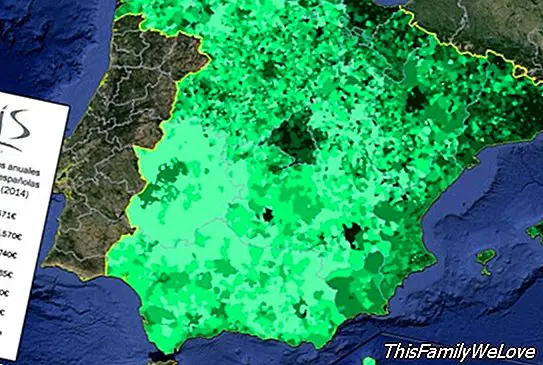Spanish families earn 4.5% less
Spanish families have counted in 2014 with 90 euros less monthly on average, according to a study prepared by the company AIS Group with the latest update of the H indicatorsabits Big Data 2014. Thus, while in 2013 Spanish families earned an average of 1,970 euros per month, in 2014 this figure has been reduced to 1,880 euros per month, which translates into a 4.5% less than the previous year.
The company AIS Group that is dedicated to the development of business intelligence and geomarketing tools has merged economic and sociodemographic data from public sources to make a map with the average net income of Spanish families. The study focuses on the 760 municipalities that have more than 10,000 inhabitants.
The Community of Madrid houses the richest families
Among the richest Spanish municipalities stand out those of the Community of Madrid. Eight of the top ten on the list are precisely in this community, whose list is headed by Boadilla del Monte, where the net income per family reaches 2,865 eruos per month on average, a figure much higher than the national average, although slightly lower -50 € per month- to the registered in this town in 2013.
The Top 10 of the municipalities with greater family income is formed by Pozuelo de Alarcón, in second place, Tres Cantos, Las Rozas, Villaviciosa de Odon, Majadahonda, Velilla de San Antonio and Torrelodones, all in the Community of Madrid. Only two municipalities of this Top 10 do not belong to the Community of Madrid: Getxo (Bizkaia), which is in seventh position, with 2,630 euros on average per family and Premià de Dalt (Barcelona), with 2,540 euros.
As a curious fact worth mentioning the Vellilla de San Antonio (Madrid), which is the expedition. So while in all municipalities of the Top 10 the average income has fallen in 2014 compared to 2013, in Velilla de San Antonio, the income of their families have risen by 5.7%, climbing from 44 in 2013 to eighth in 2014, with an average of 2,575 euros per family per month.
The map of family income: differences between north and south

The map of the average income of the families reflects how the territory is practically divided into the municipalities of the north with the highest averages and those of the south with the lowest, although, the most marked decreases correspond to localities in northern areas and the increases most notable are in southern points such as Murcia and Castilla La Mancha.
As for provincial capitals, the study points to San Sebastián as the capital with a higher average family income: 2,380 euros. They are followed closely by Vitoria (€ 2,270), Bilbao (€ 2,270) and Girona (€ 2,240). While at the other extreme are Córdoba (€ 1,600), Mérida (€ 1,615) and Las Palmas de Gran Canaria (€ 1,630).
In addition to Ciudad Real, Zaragoza is the provincial capital where the average income of families has grown the most, 7% and behind it is Toledo, with an increase of slightly over 6%. On the other hand, Madrid families have seen their average income fall by 1.7%, something similar to Barcelona, where the average income of their families was reduced by around 6% in 2014.
Marisol New
You may also like:
- 7 habits of highly effective families
- Notabli, the new social network for families
- Families will earn 225 million dollars in Communion gifts
- Traditional families in Europe: how the children of the EU live




